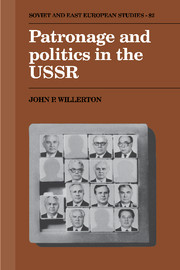Book contents
- Frontmatter
- Contents
- List of tables
- Preface
- Introduction
- 1 The elite, patronage, and Soviet politics
- 2 Networks and coalition building in the Brezhnev period
- 3 Patronage and the Brezhnev policy program
- 4 Patronage, Gorbachev, and the period of reform
- 5 Patronage and regime formation in Lithuania
- 6 Azerbaidzhan and the Aliev network
- 7 The logic of patronage in changing societies
- Appendix
- Notes
- Select bibliography
- Index
- Titles in the series
7 - The logic of patronage in changing societies
Published online by Cambridge University Press: 30 September 2009
- Frontmatter
- Contents
- List of tables
- Preface
- Introduction
- 1 The elite, patronage, and Soviet politics
- 2 Networks and coalition building in the Brezhnev period
- 3 Patronage and the Brezhnev policy program
- 4 Patronage, Gorbachev, and the period of reform
- 5 Patronage and regime formation in Lithuania
- 6 Azerbaidzhan and the Aliev network
- 7 The logic of patronage in changing societies
- Appendix
- Notes
- Select bibliography
- Index
- Titles in the series
Summary
There are few constants in political life, but one seemingly holds true regardless of time, place, or system type: politicians are primarily motivated by the pursuit of power and authority. Paraphrasing Anthony Downs, politicians formulate policies to advance their positions, rather than advance their positions so as to formulate policy. Career building is central to decision makers and policy making. Politicians' interests join together because it suits their quest for power to do so.
Politicians use numerous formal vehicles to merge their careers as they advance their power interests. Among the most important are the bureaucracies, political parties, and interest associations that comprise the policy process itself. Beyond these, politicians' own skills and experience are critical to their ability to forge working relations with others; but informal institutional factors also condition the pursuit and application of power. Patronage networks are an extralegal means for politicians to pool their resources and direct them toward group ends. Network membership offers no guarantee of success, but obviously it can provide a politician considerable assistance in the quest for power and authority.
Gyula Jozsa's notion of a “roped party” offers an apt description of the basic nature of the patronage network as it operates in the traditional Soviet system. The motivations and behavior of network members may be likened to those of a team of mountain climbers who are connected together with a protective rope, assisting one another as they make their way to the summit.
- Type
- Chapter
- Information
- Patronage and Politics in the USSR , pp. 223 - 241Publisher: Cambridge University PressPrint publication year: 1991

